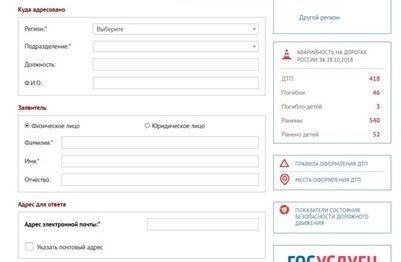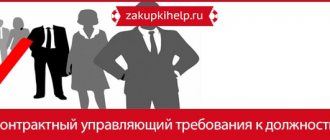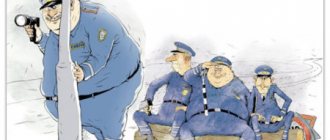When can I call the Russian State Traffic Safety Inspectorate hotline?
In the life of every citizen who is in one way or another a participant in road traffic, a situation may arise when the traffic police hotline is urgently needed. For such purposes, it is advisable to have emergency telephone numbers for many government services. But you will need the traffic police number directly if:
- in the process of interaction between the inspector and the driver, it comes to an offer to give or receive a bribe;
- when an inspector groundlessly accuses a driver of violating traffic rules, without having any evidence;
- if the inspector exceeds his official powers;
- if a driver or an ordinary citizen witnesses a traffic violation;
- if a citizen became an eyewitness or participant in an accident;
- if there is information about the incorrect work of the State Traffic Inspectorate or its individual employees;
- when it is necessary to obtain information about fines and debts.
Part 3 of Article 55 of the Constitution of the Russian Federation establishes that the rights and freedoms of man and citizen can be limited by federal law only to the extent necessary in order to protect the foundations of the constitutional system, morality, health, rights and legitimate interests of other persons, and ensure defense country and state security.
In accordance with Article 6 “Conditions for processing personal data” 4 of the Federal Law of the Russian Federation of July 27, 2006 No. 152-FZ “On Personal Data”, the processing of personal data must be carried out in compliance with the principles and rules provided for by this Federal Law. Processing of personal data is permitted in the following cases:
- if it is necessary to provide a state or municipal service in accordance with Federal Law of July 27, 2010 No. 210-FZ “On the organization of the provision of state and municipal services”, to ensure the provision of such a service, to register the subject of personal data on a single portal of state and municipal services municipal services;
— if the processing of personal data is necessary to exercise the rights and legitimate interests of the operator or third parties or to achieve socially significant goals, provided that the rights and freedoms of the subject of personal data are not violated.
Article 9 “Consent of the subject of personal data to the processing of his personal data” of the said law determines that if the subject of personal data withdraws consent to the processing of personal data, the operator has the right to continue processing personal data without the consent of the subject of personal data if there are grounds specified in paragraphs 2 - 11 part 1 article 6.
In accordance with paragraph 33 of part 1 of Article 13 of the Federal Law of the Russian Federation of February 7, 2011 No. 3-FZ “On the Police”, the police are given the right to create, maintain and use data banks of operational reference, forensic, forensic, investigative and other information about persons, objects and facts; use data banks of other government bodies and organizations, including personal data of citizens, unless otherwise provided by federal law.
The Code of the Russian Federation on Administrative Offenses, as well as other regulatory legal acts regulating the formation and maintenance of data banks, do not establish the terms and purposes for storing information in police data banks, including the State Traffic Inspectorate.
Based on the responsibilities assigned to the police to supervise traffic, the rights granted to them to maintain data banks on persons who have committed an administrative offense and the assigned purposes for storing information (for use by the State Traffic Inspectorate units in supervising traffic traffic), it follows that the storage period for information in the data banks of the State Traffic Inspectorate is about persons who have committed an administrative offense is not limited.
The completion of the execution of a decision in a case of an administrative offense, based on the above regulatory legal acts, cannot be the basis for deleting information about such violations from police databases.
In accordance with the provisions of Article 4.6. “The period during which a person is considered subject to administrative punishment” of the Code of the Russian Federation on Administrative Offenses, a person who has been assigned an administrative penalty for committing an administrative offense is considered subject to this punishment from the date the resolution imposing an administrative penalty comes into force until the expiration of one year from the day of completion of execution of this resolution.
For what questions can I call?
Hotline employees have in-depth knowledge of traffic rules and regulations governing the activities of State Traffic Inspectorate employees. Therefore, if the question asked by a citizen is formulated clearly and to the point, then the likelihood of receiving advice by phone increases significantly.
By dialing the traffic police hotline number, any citizen can get answers to the following questions:
- find out why the fine was issued, the notification of which was received by mail;
- clarify whether the payment has entered the recipient’s account and why the debt is still on the website;
- get advice from a remote employee on the situation that has happened on the road;
- find out whether the inspector’s actions towards the driver are legal;
- what to do if an inspector asks for a bribe.
Let me inspect the trunk
If a law enforcement officer asks to inspect the trunk, the driver is not required to open it. Inspection of the vehicle is carried out only in an official manner upon presentation of the relevant documents and permission from higher authorities. Otherwise, the driver has every right to refuse; he does not have to prove that there is nothing illegal in the trunk.
On a note! The inspector must always have a reason for the inspection; without appropriate documentation, such a request is inappropriate.
Basic rules of communication
If a citizen tries to call the hotline of any service, then there are good reasons for this and it is likely that the person is under stress. However, when communicating with call center employees, you should behave with restraint, be as collected as possible, and clearly state the pressing problem. The use of obscene speech, insults and threats is prohibited. Please remember that every conversation is recorded.
Before dialing the hotline number, it is worth considering the question you will ask the specialist. This will help reduce the time it takes to obtain the necessary information, and in some cases, qualified assistance. Of course, there are cases, for example, the traffic police hotline is constantly busy, and you have problems with the inspector. You should be patient and dial the number again or contact another service number, where your call will be transferred to the right consultant.
Rules for communicating with the operator
It is worth remembering two important points when calling the traffic police:
- the call can be answered by an answering machine;
- the number may be busy.
This means that the line is overloaded and you need to be patient to get advice. In any case, you should maintain composure, even if you are unsettled by the situation on the road.
Despite numerous difficulties, the State Traffic Inspectorate is being reformed, gradually acquiring the features of a high-level traffic police. A modern motorist, faced with injustice and lawlessness on the road, is no longer so defenseless, and often it is enough just to call the traffic police to rectify the situation.
Unified and regional traffic police telephone numbers
In addition to the all-Russian one, regional communication channels and hotlines are provided.
| Channel | Number | Competencies |
| All-Russian hotline. Reception is carried out around the clock. | 8(800)222-74-47 | Specialists will receive information:
The call center does not provide advice or information. Telephone staff will answer:
The service is contacted to resolve issues related to traffic rules, emergency situations and actions of traffic police officers. |
| Hotline, Moscow | +7(495)623-70-70 | |
| Hotline of the Moscow State Traffic Safety Inspectorate. Calls are accepted on weekdays and weekends, regardless of the time of day. | +7(495)974-01-11 | |
| Duty department Saint Petersburg | +7(812)234-90-21 | |
| Yekaterinburg city | +7(343)262-77-00 | |
| Krasnoyarsk | +7(391)226-85-91 | |
| Nizhny Novgorod | +7(831)246-42-47 | |
| Kazan | +7(843)533-38-88 | |
| Separate channel for requests about fines (for Muscovites) | +7(495)694-92-29 | Any questions regarding fines. |
| Regional communication channels have been created for the traffic police MREO | Information is provided about the work of institutions, addresses, work schedules of examination and registration departments, and the vehicle inspection department. | |
| Moscow | +7(495)953-28-63 | |
| Saint Petersburg | +7(812)573-27-52 | |
| Helpline of the Ministry of Internal Affairs (unlike the hotline, you do not need to provide personal data). The regions have their own call centers. | 8(800)250-02-35 | For reporting crime and corruption. |
| Reference number | 102 for mobile devices, 02 for stationary devices | To report crimes and offenses committed by employees of the Ministry of Internal Affairs |
| Hotline of the Ministry of Internal Affairs of Russia | 8(800)222-74-47 | |
| Department of the State Traffic Safety Inspectorate of the Moscow Region | +7(495)288-81-71 |
Before submitting a request, the call center operator will ask you to provide the vehicle registration certificate number or driver’s license details.
The list of helplines of regional divisions of the Ministry of Internal Affairs is indicated on the portal of the Ministry of Internal Affairs of the Russian Federation https://mvd.ru/contacts/sites.
PTS - Restoration and receipt of a duplicate of the traffic police
Replacing the PTS is necessary in cases where the document is lost or there is no free space in it to record information about the new owner.
Documentation
- Russian passport
- PTS (if available)
- STS (if available)
- A document certifying ownership of the car (sale and purchase agreement, etc.)
- OSAGO policy
Prices for services
- 800 rubles - State duty for issuing PTS
- 1500 rubles - State duty for issuing a new STS
Terms of service provision
On the day of treatment
Alternative methods of communication
On the website of the State Traffic Inspectorate https://gibdd.rf on the “Contacts” page, you can submit an appeal with a question, suggestion or complaint by first filling out a form in which you should indicate the region, full name, email address and the essence of the appeal. If necessary, you can attach documents in electronic form: files in document, video and photo formats. The appeal will be sent to the regional office.

To check traffic police fines, a mobile application has been developed for Android and iOS, which allows you to check fines from anywhere in the Russian Federation where there is Internet access. Using this program, you can receive alerts about new fines and make payments at a discount.
A convenient SMS service has been created for Muscovites: information about fines can be obtained by indicating the STS number or driver’s license. First option: fine Series Number STS. Second option: fine SeriesVUNNumberVU to number 7377.
The hotline receives many requests every day, so waiting for an answer sometimes takes a lot of time and it is not always possible to get through the first time. If all operators are busy, after a long wait the system prompts you to leave a message on the answering machine. Most reviews about the work of the telephone service are positive: the high competence of its employees is noted.
Additional communication channels greatly facilitate the interaction of citizens with the traffic police service, but not in all situations they can form a full-fledged alternative to a hotline.
How it works
At the time of writing, there are three options for filing a complaint about an offense (this is what a complaint is correctly called):
- Submit an application at the nearest department office.
- Shipping by registered mail.
- Sending through the form on the official website of the traffic police.
The point is to submit an application on your behalf, which sets out all the circumstances of the violation and its evidence. Well, due to the fact that few people want to record photos or videos on disks or flash drives, the list of methods is reduced to one - sending an application through the application form on the website.
FAQ
Like any other call center, the traffic police records calls and further analyzes the most frequently asked questions. This helps in identifying serious gaps in the work of the State Traffic Inspectorate. The top 3 included the following questions from citizens:
- The motorist sold the vehicle and does not know whether the new owner has registered it. How to check registration so as not to later become debtors for fines and transport taxes due to the buyer’s negligence.
- A traffic police officer stopped the driver for allegedly violating traffic rules and offers to resolve the issue without drawing up a report, hinting at a bribe. What should I do?
- As a result of an accident due to the fault of the other party, serious damage to the vehicle was caused. Where to go to resolve issues of compensation for damage?
And what are we going to do with you?
It happens that a traffic police inspector stops a driver for no reason, holds a long educational conversation with him without a specific purpose, without a protocol, and then tells him to choose his own punishment for an “offence” that never happened. In no case should you offer the law enforcement officer money or any other way out of the situation, so as not to become a victim of fraud.
The driver should immediately be informed that he has not violated anything, therefore he does not intend to choose a punishment for himself and answer meaningless questions, making amends. If a violation has actually been committed, the inspector must draw up a report and issue a fine officially.
Rules for communicating on the traffic police helpline
No matter how excited, outraged or irritated you are, maintain restraint and tact by calling the traffic police helpline. Remember that the connection is equipped with caller ID and conversations are recorded.
You shouldn’t swear, shout, argue, ardently proving the evidence of a traffic offense, and even more so you shouldn’t threaten traffic police officers. Insulting government officials may result in a meeting with the prosecutor .
Be as concise and polite as possible, and most importantly, be educated about your civil rights. In this case, a call to the traffic police hotline or helpline will be useful and informative for you.
Response time of duty officers
Traffic police numbers are divided into 24-hour telephone numbers and telephone numbers with limited operating hours. All duty unit numbers and 112 are available 24 hours a day (you can also call an inspector using this number). The telephone numbers available after hours vary depending on your region.
According to traffic police regulations, one call should last no more than 5 minutes. Which means that the operator must answer the call as soon as possible and take appropriate action.
Getting a driver's license for the first time
Any capable citizen of the country over the age of 16 has the right to obtain a driver's license. It all depends on the category of the vehicle for which he wants to get a driving license. An important detail: ONLY graduates of accredited driving schools can take the exam at the State Traffic Inspectorate.
What do we have to do?
1. Sign up for training at a driving school
In order to be allowed to take the exam at the State Traffic Inspectorate, you must undergo training at a driving school, pass theoretical and practical exams and receive a diploma in the specialty “Vehicle Driver”.
A list of accredited regional driving schools is available on the State Traffic Inspectorate website.
List of documents required for admission to a driving school:
- Passport;
- Medical certificate in form 003-В/у – clause 3 of the Order of the Ministry of Health of Russia “On conducting mandatory medical examination of vehicle drivers”;
- Military ID or registration certificate for citizens liable for military service under the age of 27;
- Three photographs measuring 3x4 cm.
The duration of training in a driving school depends on the selected category of vehicle and ranges from one month to six months.
The age of students at the time of passing the internal exam cannot be less than 16 years – clause 2 of Article 26 of the Federal Law “On Road Safety”.
2. Sign up for an exam at the State Traffic Inspectorate
Upon completion of training at a driving school, you must pass an exam at the state traffic inspectorate. You can sign up to take the exam by submitting an application on the State Services portal. You can take the exam at any examination unit of the State Traffic Inspectorate, regardless of your registration.
List of documents required to pass the exam:
- Passport;
- Medical certificate in form 003-В/у – clause 3 of the Order of the Ministry of Health of Russia “On conducting mandatory medical examination of vehicle drivers”;
- Document confirming completion of training (diploma in the specialty “Vehicle Driver”);
- Written consent of legal representatives (for minors).
Apply
Find MREO
Don’t forget to pay the state fee for obtaining a driver’s license on the government services portal online: it will cost you 1,400 rubles instead of 2,000 rubles for a bank receipt.
3. Pass the exam
The State Traffic Inspectorate exam consists of three parts: theory, driving on a race track, and driving in the city. In the theoretical part of the exam, you will have to answer 20 questions in 20 minutes. Positive result – no more than 2 errors.
In the practical part, you receive a certain number of points for each exercise and an overall grade of “pass” or “fail.”
You can retake the exam an unlimited number of times. The first three retakes take place at intervals of a week, then every other month. There is no additional retake fee.
It should be remembered that the results of the theoretical exam are valid only for 6 months - Art. 11 part II of the Government Decree “On admission to driving vehicles.”
Get your driver's license
After successfully passing the exam, the state traffic inspector will issue you a driver's license. The validity of a driver's license in Russia is 10 years.
Driver's license Medical examination
Passing a medical examination for a license is regulated by Order of the Ministry of Health of Russia No. 344n “On conducting a mandatory medical examination of vehicle drivers (candidate vehicle drivers).”
Required documents
- Russian passport
- Military ID (for men)
Price
- About 500-1500 rubles - for a report from a psychiatrist and narcologist
- About 500-1500 rubles - for a conclusion from a therapist
Terms of service provision
On the day of treatment
Where to contact
- Drug treatment clinics
- Psychoneurological dispensaries










